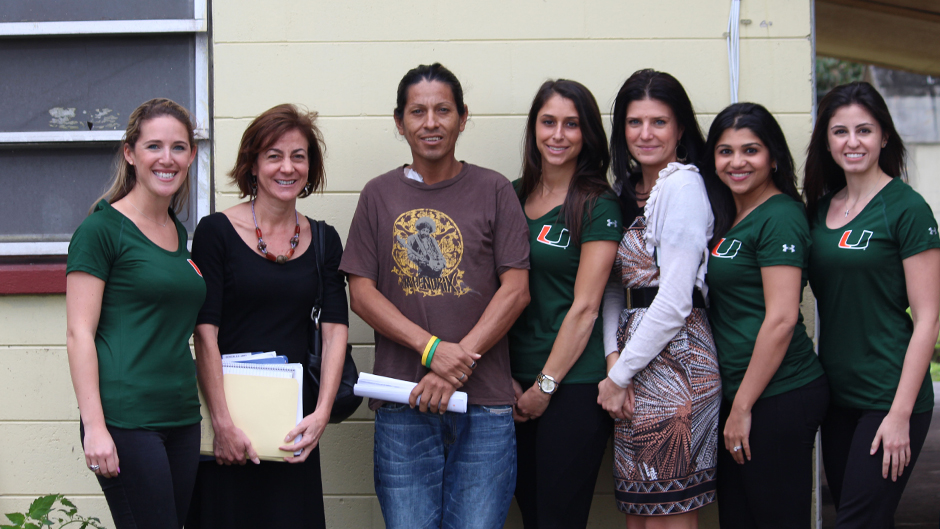The Health Rights Clinic took on a number of cases in 2010 when the Public Health Trust terminated outpatient dialysis care for the uninsured in Miami-Dade County or repatriated individuals back to their home countries when in fact they qualified for federally funded emergency Medicaid.
What the Clinic found was that none of the agencies charged with securing emergency care for the uninsured had the slightest knowledge of the benefits available or the protocol and process to apply for emergency Medicaid.
Director of the clinic, JoNel Newman was familiar with this issue as she had worked at Florida Legal Services before coming to Miami Law and had litigated a case for the Migrant Farmworkers Justice Project where a hospital had repatriated a Guatemalan national because his care was deemed too expensive for the hospital to shoulder.
Throughout Florida, the process is “locked in a drawer somewhere,” said Newman. “It’s not posted on their website or in any of their policy manuals. So every case is like starting at the beginning – figuring out who are the people that need to get involved.”
For some cases, such in the clinic’s work with undocumented farm worker Ariel Gonzalez “it was made worse because none of the information was conveyed in Spanish, and that alone is a violation of civil rights. He would go to his appointments and hand the phone to one of us to translate. If we couldn’t contact him, everyone would be imagining the worst – that we wouldn’t be able to move fast enough for him to live to see the treatment he needed.”
“Even if someone has an understanding of the policy and informed health care advocates, the process can take 90 days,” said Associate Director Melissa Swain. In Ariel’s case] our students did a remarkable job; they became so impassioned to his cause, and as a result have acquired a remarkable and valuable skill set.”
One such student is Rebecca Greenfield, a 25-year-old second year dual J.D./M.P.H. seeking student from Westchester, New York, who was tasked with dealing with the risk managers at the hospital and helping out however else she could for the Gonzalez case.
“Working at the Health Rights Clinic has made me increasingly aware of how limited access to health care is in this country,” Greenfield said. “I have also become more aware of how many people are actually left out of the safety net the Affordable Care Act was supposed to create. I hope to ultimately work on policy initiatives through my Masters in Public Health as well as throughout my career in the health care industry to improve and standardize access to care throughout this country. This summer, I will start this endeavor with Aon Hewitt's Corporate Health Exchange Team, which works to standardize employer insurance and increase provider transparency within this innovative private Exchange.”
Jenna Feldman, 24, another second year student from Baltimore, Maryland, took on the Florida Department of Children and Families, Lawnwood Hospital, and the kidney clinic following through on all the necessary forms and filings for the Gonzalez case.
Kanchi Doshi, 26, also a second-year student and from Rutherford, New Jersey, worked with Big Lake Kidney Center’s corporate and Okeechobee offices, and Velazquez was the conduit for all information flowing to and from Gonzalez.
“The extensive work that I conducted at the clinic…has provided me with valuable insight on how to overcome the various hurdles that are persistently faced in the field of health law,” said Doshi. “The clinic has helped many individuals gain access to health care and assisted with many other vital issues to ameliorate their lives. I look forward to pursuing a career in health law and engaging in future initiatives that further emphasize the mission of health advocacy.”
Feldman came to Miami Law from Tulane University as a Public Health major and teaching through the Teach for America program. “I entered law school interested in a career in health care law,” she said. “Working in the Health Rights Clinic has been an extremely rewarding learning experience, providing countless opportunities for applying practical legal skills. Our fact-gathering trip for Ariel's Emergency Medicaid case was one such opportunity. After participating in the Clinic, I feel much better prepared for a career in health care law and I look forward to working in the field as a Summer Associate at DLA Piper this summer.”
Nicole-Suzette Velazquez, 27, and a graduate from the University of North Carolina at Chapel Hill, said “We're constantly helping people navigate systems like Medicaid, which was designed to allow people to apply on their own. But, as we saw with Ariel, it's almost impossible for people to do without legal representation. And it's not just undocumented individuals who have this problem; I see this a lot in personal injury cases where I work, The Perkins Law Offices, in Coral Gables. Providers turn uninsured accident or crime victims away, not knowing that there are options available to them to help them obtain medical treatment - like Victim's Compensation claims from the Attorney General or even through Letters of Protection. The systematic failures that we saw with Ariel's case exist at all levels of healthcare and affect all kinds of individuals, including citizens. I'm the only one in the team not necessarily interested in Health law, but what I love about the Clinic is that the work we do and the lessons we learn are applicable to all areas of law.”
The Clinic’s students and supervising attorneys have been asked to present their findings and best practices information to the Mexican Consulate in Miami.

